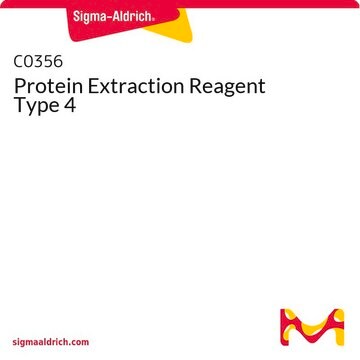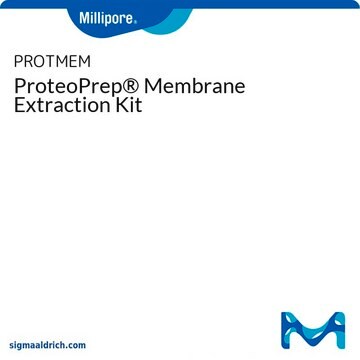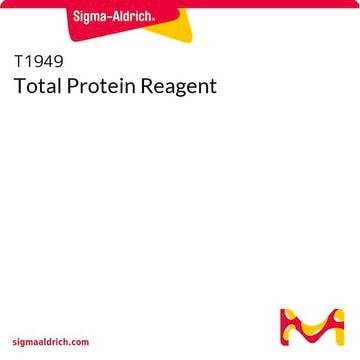PE0230
Plant Total Protein Extraction Kit
Suitable for any plant species or tissue
Synonyme(s) :
Total Protein Extraction Kit
Se connecterpour consulter vos tarifs contractuels et ceux de votre entreprise/organisme
About This Item
Code UNSPSC :
41105500
Nomenclature NACRES :
NA.56
Produits recommandés
Technique(s)
protein extraction: suitable
Température de stockage
−20°C
Description générale
The Plant Total Protein Extraction Kit is designed specifically for use in plant bioscience to extract a qualitative sample of all proteins from any type of plant species or tissue. The protocol does not require any ultracentrifugation or aqueous polymer two-phase partitioning (APTP). The kit includes two reagents; a plant specific protease inhibitor cocktail and a new chaotropic reagent with increased solubilizing power to extract more hydrophobic proteins (C0356, Protein Extraction Reagent Type 4). Routine use of the reagent in sequential protein extraction of a plant tissue sample with fresh reagent removes nearly all protein from the tissue. The protease inhibitor cocktail is a mixture of protease inhibitors with broad specificity for the inhibition of serine, cysteine, metalloproteases, aspartic, and aminopeptidases. It contains pepstatin A, 4-(2-aminoethyl)benzenesulfonyl fluoride (AEBSF), E-64, leupeptin, 1,10-phenanthroline, and bestatin. The cocktail has been demonstrated to be highly effective in preventing protein degradation during the extraction process.
Following removal of polyphenolics, tannins, and other interfering substances, ground plant tissue, fresh or frozen, is resuspended in the chaotropic reagent. Plant debris is pelleted by centrifugation and the protein extract is collected. The end result is a qualitative total protein sample, ready for downstream proteomic analysis.
Following removal of polyphenolics, tannins, and other interfering substances, ground plant tissue, fresh or frozen, is resuspended in the chaotropic reagent. Plant debris is pelleted by centrifugation and the protein extract is collected. The end result is a qualitative total protein sample, ready for downstream proteomic analysis.
Application
The plant total Protein Extraction Kit has been used to isolate crude seed protein. It has also been used to extract the total protein.
Quantité
Sufficient for preparation of 20 separate extractions from plant tissue samples of 10-250mg
Mention d'avertissement
Warning
Mentions de danger
Conseils de prudence
Classification des risques
Acute Tox. 4 Oral - Aquatic Chronic 2 - Carc. 2 - Repr. 2
Code de la classe de stockage
11 - Combustible Solids
Point d'éclair (°F)
185.0 °F - closed cup
Point d'éclair (°C)
85 °C - closed cup
Certificats d'analyse (COA)
Recherchez un Certificats d'analyse (COA) en saisissant le numéro de lot du produit. Les numéros de lot figurent sur l'étiquette du produit après les mots "Lot" ou "Batch".
Déjà en possession de ce produit ?
Retrouvez la documentation relative aux produits que vous avez récemment achetés dans la Bibliothèque de documents.
Les clients ont également consulté
Revealing proteins associated with symbiotic germination of Gastrodia elata by proteomic analysis
Zeng X, et al.
Botanical studies, 59(1), 8-8 (2018)
Samuel L Chen et al.
Frontiers in plant science, 10, 1116-1116 (2019-10-15)
Pre-mRNA alternative splicing is a conserved mechanism for eukaryotic cells to leverage existing genetic resources to create a diverse pool of protein products. It is regulated in coordination with other events in RNA metabolism such as transcription, polyadenylation, RNA transport
Xu Zeng et al.
Botanical studies, 59(1), 8-8 (2018-03-08)
Gastrodia elata, a mycoheterotrophic orchid, is a well-known medicinal herb. In nature, the seed germination of G. elata requires proper fungal association, because of the absence of endosperm. To germinate successfully, G. elata obtains nutrition from mycorrhizal fungi such as
Peitong Wang et al.
Plant physiology, 178(4), 1568-1583 (2018-10-13)
Arsenic (As) is highly toxic to plants and detoxified primarily through complexation with phytochelatins (PCs) and other thiol compounds. To understand the mechanisms of As toxicity and detoxification beyond PCs, we isolated an arsenate-sensitive mutant of Arabidopsis (Arabidopsis thaliana), arsenate
Rishiram Ramanan et al.
Plant physiology, 177(3), 1050-1065 (2018-05-18)
Algae undergo a complete metabolic transformation under stress by arresting cell growth, inducing autophagy and hyper-accumulating biofuel precursors such as triacylglycerols and starch. However, the regulatory mechanisms behind this stress-induced transformation are still unclear. Here, we use biochemical, mutational, and
Notre équipe de scientifiques dispose d'une expérience dans tous les secteurs de la recherche, notamment en sciences de la vie, science des matériaux, synthèse chimique, chromatographie, analyse et dans de nombreux autres domaines..
Contacter notre Service technique

















